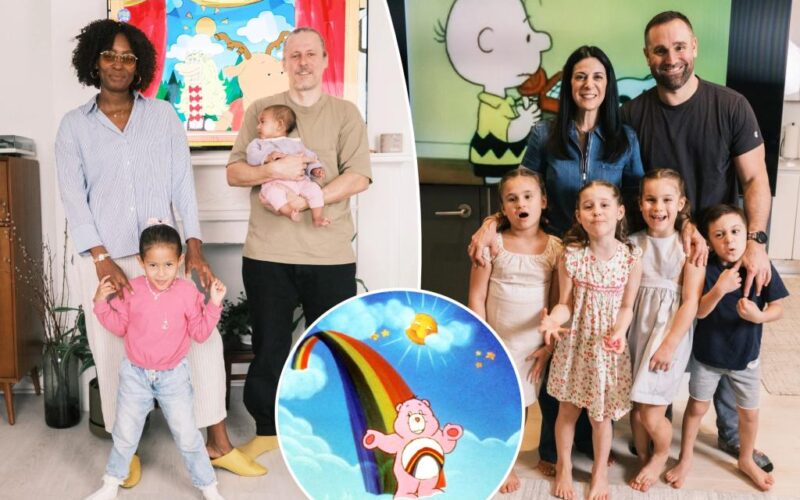When Lauren Isler first heard about “CoComelon,” an addictively popular animated streaming series that reportedly hooks toddlers on its bright colors, loud music and characters sporting oversized heads and googly eyes, she didn’t think twice about letting her young son watch.
However, the Virginia influencer, who posts as @MamasandMesses on Instagram, quickly noticed how overstimulated her child became whenever he watched the show — a bona fide streaming sensation now boasting nearly 200 billion views on YouTube alone.
“He would sit there glued to the TV and he never wanted us to turn it off,” Isler, a former teacher, said of the taken-in tyke, now 4.
“Unlike other shows he’d watch for a little bit, when ‘CoComelon’ was on, he demonstrated some negative behaviors — transitions were hard and there were tantrums, especially when it was time to turn it off,” she recounted.
And ask concerned parent Shani Hillian which cartoon she won’t allow her 4-year-old daughter to watch, and she doesn’t mince her words.
“This is a no-‘CoComelon’ household,” Hillian, a Big Apple-based beauty writer, proclaimed to The Post. “It’s too fast-paced, it’s too aggressive, and I don’t like how big their eyes are. It’s scary. I also feel like the overstimulation is playing into the short attention span I think kids already have. When kids get used to constant entertainment, they struggle with boredom and quiet play.”
The one time Hillian’s daughter saw “CoComelon” at a friend’s house, the then-3-year-old was instantly mesmerized.
“She kept asking me if she could watch it,” she said. “It has gotten so bad that now, every time I see the show pop up on Netflix, I put a thumbs-down next to it.”
These moms aren’t alone. Online, parents have compared the program to “crack” for kids, showing “CoComelon meltdowns” when they turn off the show. “Once you have a taste of the COCO, it’s hard to break the addiction,” one dad wrote.
The Post has reached out for comment from Moonbug Entertainment, which in 2020 acquired the program, created by commercial director Jay Jeon and his wife in 2006.
As these flashy, sometimes overwhelming shows for kids become the norm, moms like Isler and Hillian and hordes of families across the country are vocal with their complaints about “CoComelon” and increasingly opting out of new programming — instead turning to relatively low-tech, retro kiddie fare like the 1980s-era “Care Bears,” or Y2K favorites like PBS’ “Barney & Friends.”
Why it helps to dial it down
Concerned parents aren’t just showing their age with their dislike of the new Saturday morning routine, experts say.
Unlike cartoons in the past, some of today’s animated series do emphasize excessively loud music and bright flashing lights instead of a slower storyline with a solid narrative, like “Arthur” or “The Magic School Bus.”
According to Kathryn Smerling, Ph.D., a family therapy professional on the Upper East Side and author of the new book, “Learning to Play Again: Rediscovering Our Early Selves to Become Better Adults,” the modern offerings can have negative consequences — long after the viewing sessions end.
“Instead of having kids slow down, these cartoons jerk them up, making it hard for kids to concentrate and and sleep,” the pro explained.
“The best of the old-school shows engender conversation, while many of the new shows don’t emphasize that,” Smerling said. “They’re a lot of noise.”
Midtowner Tracy Caliendo agrees. The mom of five, who shares her life on her Instagram account, @almosttripletsnyc, said it’s been a goal of hers to “focus on less stimulation” for her 7-year-old triplet daughters and two sons, ages 6 and 18.
“All of these new shows are designed with fast-paced editing and loud effects, which can be so overwhelming,” she said.
Caliendo, also the author of family travel guidebook “ABC’s in NYC,” prefers her kids watch vintage “Charlie Brown” and the like, rather than anything new.
“We want our kids to use their imaginations and let their minds be creative,” she explained. “The Peanuts gang offers heartwarming stories with timeless themes of friendship and acceptance.”
Weary parents and caregivers reaching deep into the cartoon archives say the older fare not only teaches valuable lessons — it’s an easy way to bond with the children, too.
“As a ‘90s kid, I’m a little biased, but TV shows were just so good back then,” Isler said wistfully. “Most of the time, they had good messages for kids. My kids love ‘Bear in the Big Blue House,’ and honestly, I do, too. It’s so calming and pure.”
Introducing your kids to your favorite shows instead of watching what’s trending can be a real “attachment moment,” Smerling explained.
“A patient recently told me that he and his daughter are watching the ‘Berenstain Bears’ together,” said the pro of the animated TV series that ran in the early aughts.
“This can be a chance to cuddle with your child and say, ‘I remember when I watched this with your grandma.’ It can be a beautiful, multigenerational connection.”








